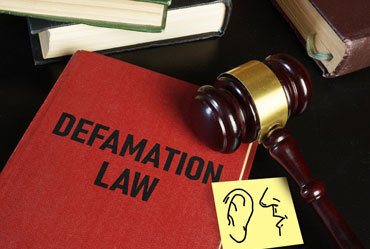Search

If someone is telling misconceptions about you, then you are free to take him/her to court for defamation. Defamation is therefore any written or spoken statement about the plaintiff which is untrue and, in most cases, brings a bad image to the said individual. Written defamation is called “libel.” Spoken defamation is called “slander.” Here, we explain how to file a defamation lawsuit and respond to the questions that will arise: what needs to be shown, how long it takes, and how much compensation one may receive.
The laws of defamation are not standard across all states in the United States of America but entail similar practices nonetheless. The nature of a claim in defamation is such that a plaintiff must prove that a defendant:
As regards the plaintiffs that are public officials, politicians, actors, professional athletes, etc., an ordinary standard of negligence is insufficient to prove their case. Public figures have to prove that a defendant acted with actual malice, that means defendant deliberately made statements which are untrue or made them recklessly without any regard to the truth. Actual malice is in fact more difficult to prove compared to negligence.
Like all the other personal wrongs; the processes followed in a defamation case are the processes followed in the general suits for personal injuries.
Usually, after you have made a decision to sue for libel or slander, you or your lawyer will prepare the document referred to as the complaint in the civil courts of your state. Complaint is considered to be that piece of evidence, which sets the stage for the lawsuit. Remember there is always a set amount of time which is given to those who wish to file a defamation lawsuit; this time is known as the “statute of limitations”.
After the complaint is filed, you have to physically deliver a copy of the complaint to the defendant based on the state’s service of process procedure. The defendant may be given a short period of time to answer your complaint filed with the court. Next, the “discovery” phase begins. The two accused and witnesses shall share information on the case at hand. For instance, providing written questions referred to as interrogatories that can be returned by the defendant. These are conducted under oath as well, and they make the end help each side to understand the facts of the case and any witnesses. You may also trade physical assets that are relevant to the entailing dispute, the most common of which are documents.
Your attorney will also assist you in gathering such proof and will also respond to the inquiries as well. It is worth mentioning that your attorney can explain at which point you are likely to refuse to produce documents or respond to questions.
This can be defined as an examination of a party or a witness in trial proceedings during trial preparation away from the actual court. Depositions assist lawyers in determining the chances of the given case’s success in front of the jury and the weaknesses and strengths of the witnesses’ testimonies.
Reasonable discoveries are instrumental in creating the foundation for settlement of the critical and contentious issues arising in disputes. If both parties gather more information about the case at hand, there will be increased chances of the defamation case being settled. Here is a list of the leading causes of the constant settling of cases out of court in personal injury cases:
If you are unable to resolve your case, such as in civil litigation, your case shall be tossed out or you proceed to trial shall commence. In as much as an individual may withdraw his/her case at will or a judge may grant the defendant’s motion to do the same.
So, understand the steps before filing a civil suit for slander or defamation cases!